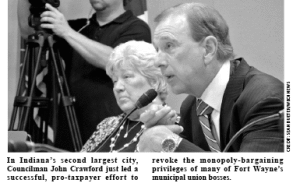Is This Any Way to Run a City’s Schools?
Leaked CTU Proposals Won’t Do Anything to Improve Schools’ Poor Performance
‘Fort Wayne Has Taken a Significant Step in the Right Direction’
(Click here to download the July 2014 National Right to Work Committee Newsletter)
In late 1968, Leonid Brezhnev concocted his so-called “Brezhnev Doctrine” as a rationalization for his recent invasion of Czechoslovakia and the installation of a new Soviet puppet regime in its capital, Prague.
 Recalling with rage that year’s “Prague Spring,” during which freedom of speech and assembly were briefly restored in a country that had gone communist 20 years earlier, the Soviet dictator blustered: The “gains of socialism” are “irreversible.”
Recalling with rage that year’s “Prague Spring,” during which freedom of speech and assembly were briefly restored in a country that had gone communist 20 years earlier, the Soviet dictator blustered: The “gains of socialism” are “irreversible.”
For decades, Big Labor bosses in America had a parallel doctrine regarding union monopoly bargaining in public employment: Once a state or locality authorizes it, it’s irreversible.
But fortunately for freedom-loving public employees as well as taxpaying businesses and families, Big Labor’s “Brezhnev Doctrine” of monopoly bargaining has eroded considerably over the past three-and-a-half years.
Illinois Gubernatorial Candidate: Wisconsin’s Act 10 Is Worth Emulating
In early 2011, elected officials in Wisconsin and Ohio heeded the pleas of pro-Right to Work constituents by adopting laws sharply limiting the scope of union monopoly bargaining in the public sector.
A few months later, Tennessee approved a measure that revoked union bosses’ monopoly over all “employee” input in discussions between school boards and teachers regarding pay, benefits, and other working conditions at K-12 public schools.
While Big Labor quickly succeeded in blocking the Ohio reform from taking effect, and later wiped it off the books, the major reforms in Wisconsin and Tennessee as well as more modest limitations on government-sector union monopoly bargaining enacted in several other states have proven to be durable.
This year Illinois GOP gubernatorial candidate Bruce Rauner, who is leading union-label incumbent Democrat Pat Quinn in most polls, has publicly indicated he would like to enact a Prairie State monopoly-bargaining rollback akin to Wisconsin’s Act 10.
And in states which allow localities the option of whether or not to recognize government union officials as county and municipal employees’ monopoly-bargaining agents, several school boards and city councils have opted over the past few years to exercise their prerogative to say “no” to Big Labor.
Individual Worker’s Freedom Trampled by Union Monopoly
The most recent example is the Hoosier State’s second largest city.
On June 24, a 6-3 majority on the Fort Wayne City Council voted to override a veto by union-“friendly” Mayor Tom Henry of a proposed ordinance revoking many municipal union bosses’ monopoly-bargaining privileges.
As a consequence of the two-thirds vote, despite Mr. Henry’s veto, monopoly bargaining is now set to be abolished in most municipal government agencies, with the unfortunate exceptions of public-safety departments.
In recent years, grass-roots efforts to roll back government union bosses’ special privileges in the Midwest and throughout the country have received critical assistance from the National Right to Work Committee and its members.
Committee Vice President Mary King applauded the Fort Wayne City Council’s decision to pound another nail in the coffin of Big Labor’s “Brezhnev Doctrine” of monopoly bargaining:
“Fort Wayne has taken a significant step in the right direction.
“Virtually whenever Big Labor wields monopoly power in the public sector, it uses it in ways harmful to taxpayers and other people who rely on vital government services.
“Many public servants also end up getting hurt economically, and all who are subjected to so-called ‘exclusive’ union representation lose their independence.”
Ms. King explained that, without a doubt, the positive changes Wisconsinites have experienced in the wake of Act 10 have inspired ordinary citizens and elected officials in other jurisdictions to push for similar reforms:
“Since the state of Wisconsin successfully fended off litigation to block Act 10 from taking effect three years ago, taxpayers have saved billions of dollars, but the ability of the state and its localities to recruit and reward good public employees has actually improved.
“School districts, for example, no longer have to waste millions and millions of dollars buying overpriced health insurance from a teacher union subsidiary, because they no longer need teacher union bosses’ acquiescence to change their insurance providers.
“Teachers can thus get better health insurance at a lower cost, and the savings can be used for better purposes such as rewarding good teachers or reducing taxes.”

Leaked CTU Proposals Won’t Do Anything to Improve Schools’ Poor Performance

Wherever Big Labor wields the power to collect forced union dues, union bosses funnel a large share of the confiscated money into efforts to elect and reelect business-bashing politicians. Employment growth tends to lag as a consequence.

Members Insist They Keep Pro-Right to Work Campaign Promises